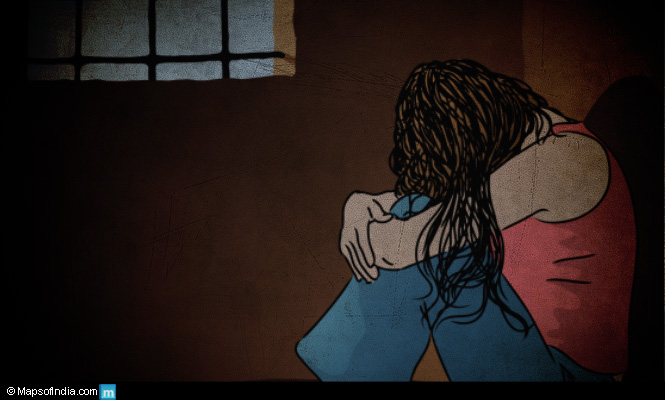 Acid attack or acid throwing is a type of violent act, in which acid or a similarly corrosive substance is thrown onto the face or body of another. In most cases, it is seen that the perpetrators throw acid on the face of the victim with the intention to torture, disfigure, maim or kill the victim. Acid burns and damages the skin tissues and in extreme cases exposes and dissolves the bones as well. Usually, the victim suffers from blindness, permanent scars on the face and body, including psychological, social, and economic problems. Today, acid attack has become one of the worst criminal acts in India.
Acid attack or acid throwing is a type of violent act, in which acid or a similarly corrosive substance is thrown onto the face or body of another. In most cases, it is seen that the perpetrators throw acid on the face of the victim with the intention to torture, disfigure, maim or kill the victim. Acid burns and damages the skin tissues and in extreme cases exposes and dissolves the bones as well. Usually, the victim suffers from blindness, permanent scars on the face and body, including psychological, social, and economic problems. Today, acid attack has become one of the worst criminal acts in India.
Acid attacks in India and the present Indian law
In 2013, Parliament enacted Section 326 A of the Indian Penal Code to ensure enhanced punishment for acid attacks. So far, there has been no proper definition of acid attacks in the Indian Penal Code. In such a case, it is difficult to put up a strong case against the culprit. At present, the criminal is booked under Section 326 of the IPC. IPC 326 deals with causing severe hurt by throwing a corrosive substance. The minimum punishment for throwing acid is 10 years imprisonment, which can extend up to life imprisonment. A separate law to punish offenders was passed along with amendment of law on sexual offences. There are certain drawbacks in the definition of acid attacks under IPC because it does not include the following. As a result, in most cases, the offenders go scot-free.
- Does not include the various types of injuries suffered due to an acid attack.
- IPC does not cover the act of planning an acid attack.
- It gives a wide variation as far as punishment is concerned.
- There are no clear facilities for awarding compensation to the victim.
Acid attack under heinous crimes category
Due to increase in the number of acid attacks on women in India, the Government has been forced to consider acid throwing cases under the ‘heinous crimes’ category, same as rape or murder. The recent acid attack on a lady doctor in West Delhi has made the Government to come up with strict enforcement of laws on an immediate basis. The Union Ministry of Home Affairs has issued a statement where it is mentioned that all such cases will be categorised as “heinous crimes” and only then a maximum punishment of life imprisonment or death sentence is possible. To strengthen the legal and administrative framework, Home Minister Rajnath Singh has approved various measures to curb acid attacks.
- The Government has decided to fix a minimum time-frame for investigation of such cases and the trial proceedings so that speedy justice is ensured.
- According to the new law, the trial of such cases has to be completed within two months.
- Also, the Ministry of Home Affairs plans to expand this by opting for more suitable amendments in the Code of Criminal Procedure for specific time-framed investigation and trial of all such heinous crimes cases.
- The sale of acid also needs to be regulated. For this, a web application will be developed to record the list of stockists and retailers, licences issued by the district administration, and also acids can be sold to individuals only after recording of the personal details like identity proof, address of the purchaser and so on. Such a step will help in reducing the unauthorised sale of acid in India.
- Moreover, it is necessary that the acid attack victims should be given immediate treatment in hospital without any hassles.
- A new mechanism will be developed very soon by the Ministry of Home Affairs along with the Ministry of Finance, Ministry of Health and Family Welfare, and insurance companies so that the victims are treated on a cashless basis. The payment for the treatment should be made by a Central Victims Compensation Fund which is proposed to be set up by Home Affairs Ministry.
- The Government has also decided to consider the acid attack victims in the same category as physically challenged or disabled persons so that they can get the benefits of reservation, training, self-employment loan etc.
Many States have made preventive laws
It is seen that many States like Maharashtra, Haryana, Karnataka, Kerala, Sikkim, Punjab and Arunachal Pradesh have already framed rules to regulate the sale of corrosive substances like acids. However, in Delhi, Madhya Pradesh, Bihar, Uttar Pradesh and Bihar, acid is easily available. It has been reported that on an average, every month, around 400 such cases are registered across the country.
This is a serious matter and should not be taken lightly. We are already scared of our girls being raped and today we also need to be scared of our girls being attacked by acids. This is an extremely violent crime and the offender needs to be punished severely. It is high time now that strict rules and regulations are be enforced on an immediate basis so that such crimes are prevented in our country.





